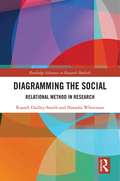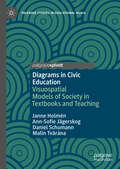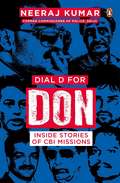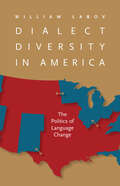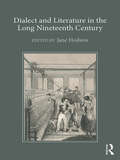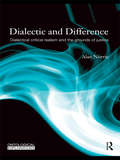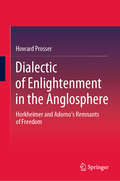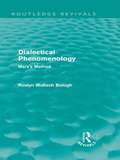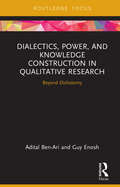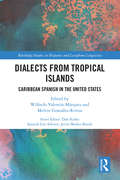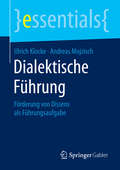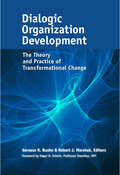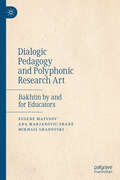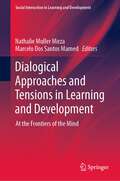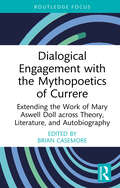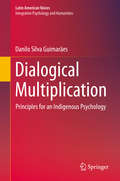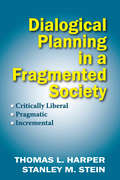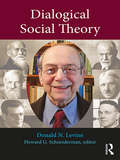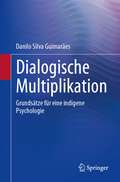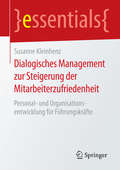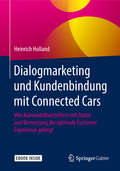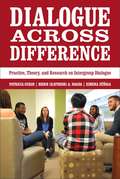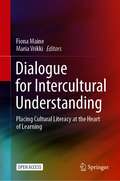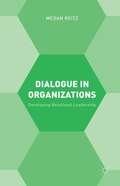- Table View
- List View
Diagramming the Social: Relational Method in Research (Routledge Advances in Research Methods)
by Natasha Whiteman Russell Dudley-SmithThis book challenges the hyper-production and proliferation of concepts in modern social research. It presents a distinctive methodological response to this tendency through an exploration of one of the most underappreciated yet widely deployed conventions for the analysis of social processes: the creation of diagrammatic relational spaces. Designed to capture social processes in a way that resists reductive and essentialist categories, such spaces have the capacity to produce powerful, systematic analyses that break the spell of concept proliferation and its resultant naively realist approach to explaining the world. Through an exploration of key examples and series of original case studies, the authors demonstrate the application of this approach across a variety of empirical settings and academic disciplines. They thus offer a relational and pragmatic approach to social research that resists current trends characterised by supposedly self-evident data and/or disconnected theory. As such, the book constitutes an important contribution to some of the central questions in current social research, and promises to unsettle and reinvigorate considerations of method across different fields of practice.
Diagrams in Civic Education: Visuospatial Models of Society in Textbooks and Teaching (Palgrave Studies in Educational Media)
by Janne Holmén Daniel Schumann Ann-Sofie Jägerskog Malin TvärånaThis book presents the findings of three studies on the use of diagrams in civic education. The first study presents an international comparison of textbook diagrams promoting national unity in diversity, with examples from ten countries. The second focuses on the depiction of migration in diagrammatic form in German textbooks, The final study was conducted in collaboration with teachers in Swedish social science classrooms, and focuses on teaching comprehension of flow charts and scatterplots. The book will be of interest to scholars of educational media, didactics, the history of education and citizenship education.
Dial D For Don: Inside Stories Of Cbi Missions
by Neeraj KumarMumbai had a series of bomb blasts in March 1993. The mastermind, Dawood Ibrahim, behind these terror attacks is not known to many. The don wanted to surrender himself and prove his innocence. In 1999 the first case of match fixing banned 6 top Indian cricketers from playing. In January 2002, a Dubai based don, responsible for kidnapping a shoe barren was arrested and he was about to escape Dubai on a forged passport to Pakistan. All these cases involved the deep investigator skills of an Indian Police Officer, Neeraj Kumar, who was then serving in the CBI. The book 'Dial D for Don: Inside Stories of CBI Case Missions’ covers several high profile cases solved by him including the arrest of Aftaab Ansari, the main accused in the shooting at the American Center in Kolkata, nabbing of Punjab CM Beant Singh’s assassin, Jagtar Singh Tara. Arrest of Romesh Sharma, a Dawood henchman masquerading as a Delhi based Politician. Neeraj Kumar successfully handled cases spanning continents working closely with agencies like FBI, Interpol and Scotland Yard.
Dialect Diversity in America: The Politics of Language Change (Page-Barbour Lectures)
by William LabovThe sociolinguist William Labov has worked for decades on change in progress in American dialects and on African American Vernacular English (AAVE). In Dialect Diversity in America, Labov examines the diversity among American dialects and presents the counterintuitive finding that geographically localized dialects of North American English are increasingly diverging from one another over time. Contrary to the general expectation that mass culture would diminish regional differences, the dialects of Los Angeles, Dallas, Chicago, Birmingham, Buffalo, Philadelphia, and New York are now more different from each other than they were a hundred years ago. Equally significant is Labov's finding that AAVE does not map with the geography and timing of changes in other dialects. The home dialect of most African American speakers has developed a grammar that is more and more different from that of the white mainstream dialects in the major cities studied and yet highly homogeneous throughout the United States.Labov describes the political forces that drive these ongoing changes, as well as the political consequences in public debate. The author also considers the recent geographical reversal of political parties in the Blue States and the Red States and the parallels between dialect differences and the results of recent presidential elections. Finally, in attempting to account for the history and geography of linguistic change among whites, Labov highlights fascinating correlations between patterns of linguistic divergence and the politics of race and slavery, going back to the antebellum United States. Complemented by an online collection of audio files that illustrate key dialectical nuances, Dialect Diversity in America offers an unparalleled sociolinguistic study from a preeminent scholar in the field.
Dialect and Literature in the Long Nineteenth Century
by Jane HodsonThe nineteenth century witnessed a proliferation in the literary uses of dialect, with dialect becoming a key feature in the development of the realist novel, dialect songs being printed by the hundreds in urban centres and dialect poetry becoming a respected form. In this collection, scholars from a wide variety of disciplines, including dialectology, literary linguistics, sociolinguistics, literary studies and the history of the English language, have come together to examine the theory, context and ideology of the use of dialect in the nineteenth century. The texts considered range from the Cumberland poetry of Josiah Relph to the novels of Frances Trollope and Elizabeth Gaskell, and from popular Tyneside song to the dialect poetry of Alfred Tennyson. Throughout the volume, the contributors debate whether or not 'authenticity' is a meaningful category, the significance of metalanguage and paratext in the presentation of dialect, the differences between 'literary dialect' and 'dialect literature', the responses of 'insider' versus 'outsider' audiences and whether the representation of dialect is a hegemonic or resistant strategy. This is the first book to focus on practices of dialect representation in literature in the nineteenth century. Taken together, the chapters offer an exciting overview of the challenging work currently being undertaken in this field.
Dialectic and Difference: Dialectical Critical Realism and the Grounds of Justice
by Alan NorrieDialectic and Difference is the first systematic exploration of Roy Bhaskar’s dialectical philosophy and its implications for ethics and justice. That philosophy has three aims: a dialecticisation of original critical realism, a ‘critical realisation’ of dialectic, and a metacritique of western philosophy. In the first, real absence or negativity links structured being to dialectical becoming in a dynamic world. The second draws on Marx to locate the critical impulse in Hegel’s dialectic in a material, open and changing totality. The third identifies a central problem in western philosophy from the Greeks on, the failure to think real negativity as the essence of change (‘ontological monovalence’). Bhaskar’s ethics connect basic human ontology with universal principles of freedom and solidarity. He marries (‘constellates’) these with a grasp of how principles are historically shaped. His account of freedom moves from the infant’s ‘primal scream’ to the eudaimonic society, but thinks the limits to freedom under modern conditions. The morally real in ethics and justice is displaced and reconfigured as relations between ‘the ideal’ and ‘the actual’. Western philosophy systematically denies the real negativity that drives Bhaskar’s dialectic. Metacritique traces this to Parmenides and Plato’s account of non-being as difference. It enables a critique of the poststructural radicalisation of difference via Nietzsche and the doctrine of ‘Heraclitan flux’. Mobilised as ‘the other’ of Plato’s Forms, this remains a move on Platonic terrain. It too denies real negativity in structured being as the ground of historical change and moral praxis. This text is essential reading for all serious students of social theory, philosophy, and legal theory.
Dialectic of Enlightenment in the Anglosphere: Horkheimer and Adorno's Remnants of Freedom
by Howard ProsserThis book explores the reception of Max Horkheimer and Theodor W. Adorno’s Dialectic of Enlightenment. It examines a variety of perspectives on the text, supplied by e.g. American critical theorists, British New Leftists, Transatlantic Cultural Studies scholars, Postmodernists, and those working in the current after-theory moment from 1970 to 2010. It considers the works of the Frankfurt School, especially Horkheimer and Adorno, alongside the secondary literature on the subject. The main focus is on how various intellectual circles and trends have responded to the Dialectic, making scholarly discussions the primary sources. While the work is a history of the Dialectic of Enlightenment’s Anglophone reception, it also reflects the post-1968 left’s retreat to academia, which echoes the Frankfurt School’s own stance of political resignation.
Dialectical Phenomenolgy: Marx's Method (Routledge Revivals)
by Roslyn Wallach BologhIn this inquiry into Marx’s method of theorising, originally published in 1979, Roslyn Bologh analyses theory in the same way that Marx analyses the production of capital, and provides a set of rules for reproducing Marx’s method. The rules are developed through an examination of the Grundrisse, a text by Marx that combines his technical critique of political economy with his humanistic, philosophical concerns and his historical perspective. Dr Bologh concludes that Marx’s method, as dialectical phenomenology, offers a way of analysing language, knowledge and the social relations and practices of everyday life, as well as the more obvious phenomena of capitalism.
Dialectics, Power, and Knowledge Construction in Qualitative Research: Beyond Dichotomy (Routledge Advances in Research Methods)
by Adital Ben-Ari Guy EnoshThis book is about going beyond dichotomy. The research literature in social sciences is full of apparent dichotomies such as the dichotomy between: qualitative and quantitative approaches; "reality" and "multiple-realities"; ontology and epistemology; researchers and participants; the right and wrong conduct of research; and sometimes even between the goals of research and the ethics of research. Throughout the book, it is shown that adopting a dialectical approach, which attempts to integrate apparent contradictions and opposites at a higher level of abstraction, may serve as a way out of the twin horns of such dilemmas. To begin this journey, the authors start with the classical dilemma of the relationship between "reality" and "knowledge", as a common divide between the quantitative and qualitative epistemological paradigms, and the philosophical assumptions underlying them. To illustrate the understanding of the relationship between knowledge and reality, metaphors of "maps and territories" are used as a framework for the dialectical construction of knowledge. This book will be valuable to a diverse readership, including scholars interested in epistemology and philosophy of science and research methods, mainly from qualitative traditions. It will also be of interest to quantitative researchers as well, including supervisors of graduate students, lecturers and, most importantly, students and researchers-to-be.
Dialects from Tropical Islands: Caribbean Spanish in the United States (Routledge Studies in Hispanic and Lusophone Linguistics)
by Javier Muñoz-Basols Wilfredo Valentín-Márquez Melvin González-Rivera Dale KoikeDialects from Tropical Islands: Caribbean Spanish in the United States provides a comprehensive account of current research on Caribbean Spanish in the United States from different theoretical perspectives and linguistic areas. This edited volume highlights current scholarship and linguistic analyses in four major areas relative to Caribbean Spanish in the United States: phonological and phonetic variation, morphosyntactic approaches, sociolinguistic perspectives, and heritage-language acquisition. This volume will be of interest to linguists and philologists who specialize in Spanish, Caribbean Spanish, Spanish in the United States, or in Romance languages in general.
Dialektische Führung: Förderung von Dissens als Führungsaufgabe (essentials)
by Ulrich Klocke Andreas MojzischUlrich Klocke und Andreas Mojzisch stellen mit der dialektischen Führung einen neuen Ansatz vor, bei dem Führungskräfte Dissens in ihrem Team fördern, um Entscheidungen zu verbessern. Auf der Basis von Führungs- und Gruppenforschung sowie aktuellen Fallbeispielen liefert das Essential konkrete Verhaltensempfehlungen, wie ührungskräfte dabei vorgehen sollten, damit der Dissens nicht zu Konflikten auf der Beziehungsebene führt und am Ende alle Beteiligten die getroffene Entscheidung akzeptieren.
Dialogic Organization Development: The Theory and Practice of Transformational Change
by Robert J. Marshak Gervase R. BusheA Dynamic New Approach to Organizational ChangeDialogic Organization Development is a compelling alternative to the classical action research approach to planned change. Organizations are seen as fluid, socially constructed realities that are continuously created through conversations and images. Leaders and consultants can help foster change by encouraging disruptions to taken-for-granted ways of thinking and acting and the use of generative images to stimulate new organizational conversations and narratives. This book offers the first comprehensive introduction to Dialogic Organization Development with chapters by a global team of leading scholar-practitioners addressing both theoretical foundations and specific practices.
Dialogic Pedagogy and Polyphonic Research Art: Bakhtin by and for Educators
by Ana Marjanovic-Shane Eugene Matusov Mikhail GradovskiThis book presents voices of educators describing their pedagogical practices inspired by the ethical ontological dialogism of Mikhail M. Bakhtin. It is a book of educational practitioners, by educational practitioners, and primarily for educational practitioners. The authors provide a dialogic analysis of teaching events in Bakhtin-inspired classrooms and emerging issues, including: prevailing educational relationships of power, desires to create a so-called educational vortex in which all students can experience ontological engagement, and struggles of innovative pedagogy in conventional educational institutions. Matusov, Marjanovic-Shane, and Gradovski define a dialogic research art, in which the original pedagogical dialogues are approached through continuing dialogues about the original issues, and where the researchers enter into them with their mind and heart.
Dialogic Pedagogy and Polyphonic Research Art: Bakhtin by and for Educators
by Ana Marjanovic-Shane Eugene Matusov Mikhail GradovskiThis book presents voices of educators describing their pedagogical practices inspired by the ethical ontological dialogism of Mikhail M. Bakhtin. It is a book of educational practitioners, by educational practitioners, and primarily for educational practitioners. The authors provide a dialogic analysis of teaching events in Bakhtin-inspired classrooms and emerging issues, including: prevailing educational relationships of power, desires to create a so-called educational vortex in which all students can experience ontological engagement, and struggles of innovative pedagogy in conventional educational institutions. Matusov, Marjanovic-Shane, and Gradovski define a dialogic research art, in which the original pedagogical dialogues are approached through continuing dialogues about the original issues, and where the researchers enter into them with their mind and heart.
Dialogical Approaches and Tensions in Learning and Development: At the Frontiers of the Mind (Social Interaction in Learning and Development)
by Nathalie Muller Mirza Marcelo Dos Santos MamedThe book pursues the goal of exploring and strengthening a dialogical approach of communication and cognition. It brings together contributions from world-leading researchers related to the dialogical approach in education and psychology. It presents, among others, the place of language and materiality in the development of communication and thinking, as well as the role of the methods in the relationship between researchers and participants. This leads to an innovative definition of the dialogicality and how a dialogical approach can provide heuristic (conceptual and methodological) tools to better understand how people think, communicate and learn in a complex world.The authors hereby develop an epistemological framework inspired by scholars such as Michaïl Bakhtin, Lev Vygotsky and Herbert Mead under the assumption that dialogue, or dialogicality - and therefore the presence of the other – is fundamentally entangled into the human thinking and development.This book contributes to the understanding of human communication, cognition and mind, and participates in a scientific dialogue which helps to advance future research. It includes theoretical and empirical chapters and presents innovative methods of inquiry, which makes it a useful tool for both teaching and research.
Dialogical Engagement with the Mythopoetics of Currere: Extending the Work of Mary Aswell Doll across Theory, Literature, and Autobiography (Studies in Curriculum Theory Series)
by Brian CasemoreThis volume showcases a series of chapters that elaborate on Mary Aswell Doll’s contributions to the field of curriculum theory through her examination of currere as a mythopoetics. By bringing Doll’s Jungian, autobiographical, and literary perspectives into conversation with emergent forms of subjective inquiry—including aesthetic concepts, ecological questions, and spiritual themes—the volume foregrounds the originality and significance of Doll’s book The Mythopoetics of Currere in particular, while simultaneously extending it and demonstrating its applications in various scholarly conversations. Leading scholars in the field of curriculum studies such as William F. Pinar and Molly Quinn demonstrate how they use Doll’s ideas as pedagogy, as theoretical framing for their work, and as the basis of their own study and self-exploration. A response essay from Doll herself concludes the text, bringing further thought and insight to the mythopoetic dimensions of currere. This text will benefit scholars, academics, and students in the fields of curriculum studies, curriculum theory, and the foundations of education more broadly. Teachers and teacher educators interested in the conceptualization of curriculum in humanities education will also benefit from this volume.
Dialogical Multiplication: Principles for an Indigenous Psychology (Latin American Voices)
by Danilo Silva GuimarãesThis book presents a theoretical framework developed to support psychologists working with indigenous people and interethnic communities. Departing from the cultural shock experienced as a psychologist working with indigenous people in Brazil, Dr. Danilo Silva Guimarães identifies the limits of traditional psychological knowledge to deal with populations who don’t share the same ethos of the European societies who gave birth to psychology as a modern science and proposes a new approach to go beyond the epistemological project that aimed to construct a subject able to represent the world free from any cultural mediation. According to the author, the purpose of cultural psychology is to produce general psychological theories about the cultural mediation of the self, others and world relationships. Based on this assumption, he argues that to achieve this aim, cultural psychology needs to understand how indigenous perspectives participate in the process of knowledge construction, transforming psychological conceptions and practices. In this volume, the author presents his own contribution to open cultural psychology to indigenous perspectives by discussing the theoretical and practical implications of the notion of dialogical multiplication for the construction of work in co-authorship in the relation between psychology and indigenous peoples. With the growing migrations around the world, competences in psychological communication across cultures are more demanded each day, which makes Dialogical Multiplication – Principles for an Indigenous Psychology a critical resource for psychologists working with interethnic and intercultural communities around the world.
Dialogical Planning in a Fragmented Society: Critically Liberal, Pragmatic, Incremental
by Thomas L. Harper Stanley SteinThe culmination of a critical study of neo-pragmatism philosophy and its application to planning, Dialogical Planning in a Fragmented Society begins with philosopher Stanley M. Stein's examination of neo-pragmatism and his thoughts on how it can be useful in the field of environmental design-specifically, how it can be applied to planning procedures and problems. Neo-pragmatism is an approach that has been, in the past, best expressed or implied in the writing of Hilary Putnam, Richard Rorty, and, in particular, Donald Davidson, John Rawls, and Ludwig Wittgenstein. Thomas L. Harper furthers this tradition by providing the context for this theoretical application from his academic background in economics and management as well as his practical experience with political decision-making processes, community planning, and economic development. The result is a fresh synthesis of ideas-a new approach to thinking about planning theory and its implications for, and relationship with, practice. Philosopher Michael Walzer has asserted that "philosophy reflects and articulates the political culture of its time, and politics presents and enacts the arguments of philosophy." Similarly, the authors view planning theory as planning reflected upon in tranquility, away from the tumult of battle, and planning practice as planning theory acted out in the confusion of the trenches. Each changes the other in a dynamic way, and the authors demonstrate the intimate and inextricable link between them.
Dialogical Social Theory
by Donald N. LevineIn his final work, Donald N. Levine, one of the great late-twentieth-century sociological theorists, brings together diverse social thinkers. Simmel, Weber, Durkheim, Parsons, and Merton are set into a dialogue with philosophers such as Hobbes, Smith, Montesquieu, Comte, Kant, and Hegel and pragmatists such as Peirce, James, Dewey, and McKeon to describe and analyze dialogical social theory. This volume is one of Levine’s most important contributions to social theory and a worthy summation of his life’s work. Levine demonstrates that approaching social theory with a cooperative, peaceful dialogue is a superior tactic in theorizing about society. He illustrates the advantages of the dialogical model with case studies drawn from the French Philosophes, the Russian Intelligentsia, Freudian psychology, Ushiba’s aikido, and Levine’s own ethnographic work in Ethiopia. Incorporating themes that run through his lifetime’s work, such as conflict resolution, ambiguity, and varying forms of social knowledge, Levine suggests that while dialogue is an important basis for sociological theorizing, it still vies with more combative forms of discourse that lend themselves to controversy rather than cooperation, often giving theory a sense of standing still as the world moves forward. The book was nearly finished when Levine died in April 2015, but it has been brought to thoughtful and thought-provoking completion by his friend and colleague Howard G. Schneiderman. This volume will be of great interest to students and teachers of social theory and philosophy.
Dialogische Multiplikation: Grundsätze für eine indigene Psychologie
by Danilo Silva GuimarãesDieses Buch stellt einen theoretischen Rahmen vor, der zur Unterstützung von Psychologen entwickelt wurde, die mit indigenen Völkern und interethnischen Gemeinschaften arbeiten. Ausgehend von dem Kulturschock, den er als Psychologe bei der Arbeit mit indigenen Völkern in Brasilien erlebte, zeigt Dr. Danilo Silva Guimarães die Grenzen des traditionellen psychologischen Wissens im Umgang mit Bevölkerungsgruppen auf, die nicht dasselbe Ethos der europäischen Gesellschaften teilen, aus denen die Psychologie als moderne Wissenschaft hervorging, und schlägt einen neuen Ansatz vor, um über das erkenntnistheoretische Projekt hinauszugehen, das darauf abzielte, ein Subjekt zu konstruieren, das die Welt frei von jeglicher kulturellen Vermittlung darstellen kann. Nach Ansicht des Autors besteht das Ziel der Kulturpsychologie darin, allgemeine psychologische Theorien über die kulturelle Vermittlung des Selbst, der anderen und der Beziehungen zur Welt aufzustellen. Ausgehend von dieser Annahme argumentiert er, dass die Kulturpsychologie, um dieses Ziel zu erreichen, verstehen muss, wie indigene Perspektiven am Prozess der Wissenskonstruktion teilnehmen und psychologische Konzepte und Praktiken verändern. In diesem Band stellt der Autor seinen eigenen Beitrag zur Öffnung der Kulturpsychologie für indigene Perspektiven vor, indem er die theoretischen und praktischen Implikationen des Begriffs der dialogischen Multiplikation für die Konstruktion von Arbeit in Ko-Autorenschaft in der Beziehung zwischen Psychologie und indigenen Völkern diskutiert. Mit den wachsenden Migrationsbewegungen auf der ganzen Welt werden Kompetenzen in der psychologischen Kommunikation über Kulturen hinweg immer mehr gefordert. Dies macht Dialogische Multiplikation - Prinzipien für eine indigene Psychologie zu einer wichtigen Ressource für Psychologen, die mit interethnischen und interkulturellen Gemeinschaften auf der ganzen Welt arbeiten.
Dialogisches Management zur Steigerung der Mitarbeiterzufriedenheit: Personal- und Organisationsentwicklung für Führungskräfte (essentials)
by Susanne KleinhenzDieses Buch befasst sich mit dem Zusammenhang von Mitarbeiterzufriedenheit und der psychologischen Präferenz von Führungskräften. Es widmet sich der Erhöhung der Mitarbeiterzufriedenheit durch Einführung eines Dialogischen Managements. Im Mittelpunkt steht daher die praxisnahe Implementierung eines Dialogischen Managements in Abhängigkeit der psychologischen Präferenz der jeweiligen Führungskräfte. Hierbei werden insbesondere Organisations- und Personalentwicklungsmodelle umsetzungsnah besprochen. Der Leser erfährt, in welcher Situation er welche Methode einsetzen kann und unter welchen Voraussetzungen Methoden effektiv und effizient die gewünschten Veränderungen bewirken können.
Dialogmarketing und Kundenbindung mit Connected Cars: Wie Automobilherstellern Mit Daten Und Vernetzung Die Optimale Customer Experience Gelingt
by Heinrich HollandLesen Sie in diesem Buch alles zum Thema Dialogmarketing und Kundenbindung hinsichtlich Connected Cars in der Automobilbranche. Das Auto der Zukunft ist mit der Umwelt sowie anderen Verkehrsteilnehmern vernetzt und Teil des Internet of Things. Mit Hilfe einer stetigen Internetverbindung sind Connected Cars dazu in der Lage, überall und permanent online zu sein. Da es im Bereich der digitalen Vernetzung mittlerweile hohen Innovationsdruck und einen starken Verdrängungswettbewerb gibt, liefern sich Fahrzeughersteller, Telekommunikationsanbieter sowie IT-Riesen heute einen echten Machtkampf um die Hoheit im Connected Car. Heinrich Hollands Buch über „Dialogmarketing und Kundenbindung mit Connected Cars - Wie Automobilherstellern mit Daten und Vernetzung die optimale Customer Experience gelingt“ zeigt die Potenziale von Autos mit Konnektivitätstechnologien in folgenden Bereichen auf: Digitale Dienstleistungen Kundenbindung Kundendialog Das ausführliche Dialogmarketing-Buch für die Automobilbranche beschreibt die Transformation vom Automobilhersteller zum Serviceanbieter mit zunehmender Bedeutung der produktbegleitenden Dienstleistungen. Im Zuge dessen macht Heinrich in seinem Buch ebenfalls deutlich, welche neuen Chancen sich für den Dialog mit den Kunden und die Kundenbindung durch Data Driven Marketing im Bereich der Connected Cars eröffnen. Aktuelle wissenschaftliche Erkenntnisse und praktische Orientierungshilfen Autor Heinrich Holland gibt der Automobilbranche ein wegweisendes Dialogmarketing-Buch an die Hand, um neue Geschäftspotenziale und Anwendungsfelder für das Marketing im Bereich des vernetzten Fahrens zu entdecken. Hierfür liefert das Werk ebenfalls: ü Aktuelle Forschungsergebnisse ü Analysen hinsichtlich Adoption und Akzeptanz durch die Endnutzer ü Praktische Orientierungshilfen für den Wirtschaftszweig Damit hilft dieser umfassende Ratgeber der Automobilindustrie dabei, sich die Chancen, den digitalen Wandel mit Connected Cars in Produkte, Wertschöpfungsketten und Geschäftsmodelle zu integrieren, optimal zunutze zu machen.
Dialogue Across Difference: Practice, Theory, and Research on Intergroup Dialogue
by Patricia Gurin Ximena Zuniga Biren Ratnesh NagdaDue to continuing immigration and increasing racial and ethnic inclusiveness, higher education institutions in the United States are likely to grow ever more diverse in the 21st century. This shift holds both promise and peril: Increased inter-ethnic contact could lead to a more fruitful learning environment that encourages collaboration. On the other hand, social identity and on-campus diversity remain hotly contested issues that often raise intergroup tensions and inhibit discussion. How can we help diverse students learn from each other and gain the competencies they will need in an increasingly multicultural America? Dialogue Across Difference synthesizes three years’ worth of research from an innovative field experiment focused on improving intergroup understanding, relationships and collaboration. The result is a fascinating study of the potential of intergroup dialogue to improve relations across race and gender. First developed in the late 1980s, intergroup dialogues bring together an equal number of students from two different groups – such as people of color and white people, or women and men – to share their perspectives and learn from each other. To test the possible impact of such courses and to develop a standard of best practice, the authors of Dialogue Across Difference incorporated various theories of social psychology, higher education, communication studies and social work to design and implement a uniform curriculum in nine universities across the country. Unlike most studies on intergroup dialogue, this project employed random assignment to enroll more than 1,450 students in experimental and control groups, including in 26 dialogue courses and control groups on race and gender each. Students admitted to the dialogue courses learned about racial and gender inequalities through readings, role-play activities and personal reflections. The authors tracked students’ progress using a mixed-method approach, including longitudinal surveys, content analyses of student papers, interviews of students, and videotapes of sessions. The results are heartening: Over the course of a term, students who participated in intergroup dialogues developed more insight into how members of other groups perceive the world. They also became more thoughtful about the structural underpinnings of inequality, increased their motivation to bridge differences and intergroup empathy, and placed a greater value on diversity and collaborative action. The authors also note that the effects of such courses were evident on nearly all measures. While students did report an initial increase in negative emotions – a possible indication of the difficulty of openly addressing race and gender – that effect was no longer present a year after the course. Overall, the results are remarkably consistent and point to an optimistic conclusion: intergroup dialogue is more than mere talk. It fosters productive communication about and across differences in the service of greater collaboration for equity and justice. Ambitious and timely, Dialogue Across Difference presents a persuasive practical, theoretical and empirical account of the benefits of intergroup dialogue. The data and research presented in this volume offer a useful model for improving relations among different groups not just in the college setting but in the United States as well.
Dialogue for Intercultural Understanding: Placing Cultural Literacy at the Heart of Learning
by Fiona Maine Maria VrikkiThis open access book is a result of an extensive, ambitious and wide-ranging pan-European project focusing on the development of children and young people’s cultural literacy and what it means to be European in the 21st century prioritising intercultural dialogue and mutual understanding. The Horizon 2020 funded, 3-year DIalogue and Argumentation for cultural Literacy Learning (DIALLS) project included ten partners from countries in and around Europe with the aim to centralise co-constructive dialogue as a main cultural literacy value and to promote tolerance, empathy and inclusion. This is achieved through teaching children in schools from a young age to engage together in discussions where they may have differing viewpoints or perspectives, to enable a growing awareness of their own cultural identities, and those of others. Central to the project is children’s engagement with wordless picture books and films, which are used as stimuli for discussions around core cultural themes such as social responsibility, living together and sustainable development. In order to enable intercultural dialogue in action, the project developed an online platform as a tool for engagement across classes, and which this book elaborates on.The book explores themes underpinning this unique interdisciplinary project, drawing together scholars from cultural studies, civics education and linguistics, psychologists, socio-cultural literacy researchers, teacher educators and digital learning experts. Each chapter of the book explores a theme that is common to the project, and celebrates its interdisciplinarity by exploring these themes through different lenses.
Dialogue in Organizations
by Megan ReitzIn politics, business and wider society, 'better' leadership and dialogue are seen as antidotes to the paradoxical issues of the modern world. Dialogues in Organizations illustrates how the compulsion for 'busyness', the entrenched assumptions about who leaders are (and what they should do) and the adherence to implicitly-held cultural norms threaten the possibility of effective dialogue in our organizations. The quality of the leader-follower encounter is examined using an action research approach. The stories and images drawn from this process reveal the challenges faced in enabling dialogue and developing 'relational leadership' in organizations. This book explores how relationships at work impact us as human beings and how this helps and hinders us in our ambition to be the people we want to be.
